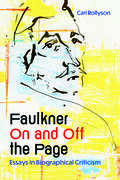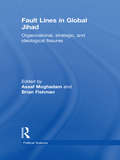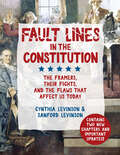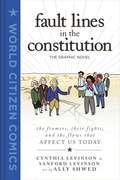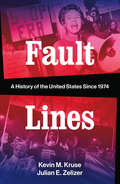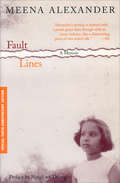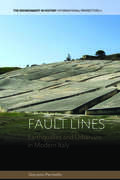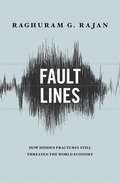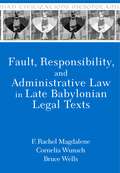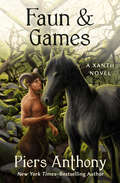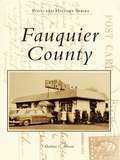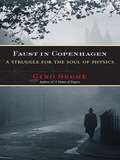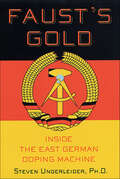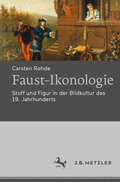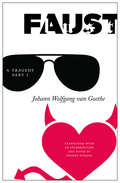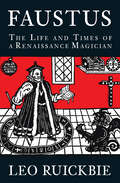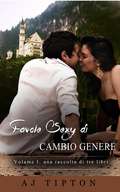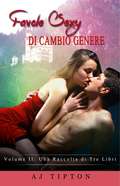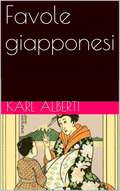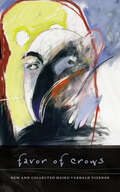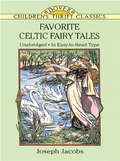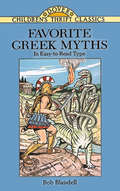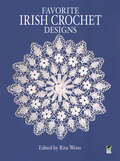- Table View
- List View
Faulkner On and Off the Page: Essays in Biographical Criticism
by Carl RollysonThough numerous biographies have been published on William Faulkner, readers are often presented conflicting interpretations of his life and work. Faulkner’s view of himself and his own family was mercurial, and it is widely acknowledged that Faulkner was an unreliable narrator of his own life. As a result, biographies of Faulkner echo and complicate the multitude of ways he portrayed himself, accepting that truth—if it exists—is subjective. Like his work, Faulkner’s own life, then, is not only open to different readings but welcomes them within the landscape of his oeuvre.Faulkner On and Off the Page acknowledges the challenges of “factifying” a life into a textual narrative, while also emphasizing the potential for biography to establish a throughline that traces how literature emerges from life and, in turn, shapes the life narrative Faulkner constructed for himself. Unburdened by the sanctity of the written word, Faulkner embraced mutability and perpetual evolution. This process of reinvention also manifests within the pages of Faulkner's biographies, as each biographer brings a unique context and perspective shaped by generations of Faulkner scholars.Rather than thinking of Faulkner as exclusively the great high modernist who strayed to Hollywood when he needed the money and stayed home when he didn’t, this book portrays an unsettled writer incessantly on the move incorporating what only looked like alien elements into his work, while maintaining a public persona that disparaged anything that did not fit the narrative of the novelist he created in interviews, essays, and speeches. This book attempts to carry on the work of finding the man on the page even as he is shaping a life off of it.
Fault Lines in Global Jihad: Organizational, Strategic, and Ideological Fissures (Political Violence)
by Assaf Moghadam Brian FishmanThis book deals with the causes, nature, and impact of the divisions within the jihadi movement, and the splits between jihadis and other Islamic groups. Fault Lines in Global Jihad offers a systematic and comprehensive examination of the broad range of divisions that contribute to the weakening of the jihadi movement. It separates these divisions into two broad categories, namely fissures dividing jihadis themselves, and divisions separating jihadis from other Muslim and Islamist groups. The first part of the book covers intra-jihadi divisions, highlighting tensions and divisions over strategic, tactical, and organizational issues. The second part of the book addresses several important case studies of jihadi altercations with other Muslim and Islamist groups of non-jihadi persuasion, such as the Muslim Brotherhood, Hamas, and the Shii community. More than simply an enumeration of problems and cracks within al-Qa’ida and its cohorts, this book addresses critical policy issues of relevance to the broader struggle against the global jihadi movement. The editors conclude that these divisions have and continue to weaken al-Qa’ida, but neither in an automatic nor in an exclusive fashion—for these divisions render the global jihadi movement simultaneously vulnerable and more resilient. This book will be of much interest to students of jihadism, terrorism and political violence, Islamism, security studies and IR in general.
Fault Lines in the Constitution: The Framers, Their Fights, and the Flaws that Affect Us Today
by Sanford Levinson Cynthia LevinsonA noted children's nonfiction author and one of the nation's foremost constitutional scholars team up to create an essential book on the United States Constitution for everyone grappling with today's most urgent political issues.Many of the political issues we struggle with today have their roots in one place—the U.S. Constitution. Fault Lines in the Constitution takes readers back to the creation of this historic document and reveals how many of the problems that trouble us today—such as voting rights, the Electoral College, gerrymandering—were first introduced. Cynthia and Sanford Levinson explain the unexpected ramifications of decisions make in 1787 and explore possible solutions found in the constitutions of states and other countries.Each chapter begins with a story―all but one of them true―that connects directly back to a section of the document that forms the basis of our society and government. Informative sidebars and graphics run throughout along with a timeline and bibliography.
Fault Lines in the Constitution: The Graphic Novel (World Citizen Comics)
by Sanford Levinson Cynthia LevinsonThe latest volume in our World Citizen Comics graphic novel series, Fault Lines in the Constitution teaches readers how this founding document continues to shape modern American society.In 1787, after 116 days of heated debates and bitter arguments, the United States Constitution was created. This imperfect document set forth America’s guiding principles, but it would also introduce some of today's most contentious political issues—from gerrymandering, to the Electoral College, to presidential impeachment.With colorful art, compelling discourse, and true stories from America's past and present, Fault Lines in the Constitution: The Graphic Novel sheds light on how today's political struggles have their origins in the decisions of our Founding Fathers. Children’s book author Cynthia Levinson, constitutional law scholar Sanford Levinson, and artist Ally Shwed deftly illustrate how contemporary problems arose from this founding document—and then they offer possible solutions.
Fault Lines: A History Of The United States Since 1974
by Julian E. Zelizer Kevin M. KruseTwo award-winning historians explore the origins of a divided America. If you were asked when America became polarized, your answer would likely depend on your age: you might say during Barack Obama’s presidency, or with the post-9/11 war on terror, or the culture wars of the 1980s and 1990s, or the “Reagan Revolution” and the the rise of the New Right. For leading historians Kevin M. Kruse and Julian E. Zelizer, it all starts in 1974. In that one year, the nation was rocked by one major event after another: The Watergate crisis and the departure of President Richard Nixon, the first and only U.S. President to resign; the winding down of the Vietnam War and rising doubts about America’s military might; the fallout from the OPEC oil embargo that paralyzed America with the greatest energy crisis in its history; and the desegregation busing riots in South Boston that showed a horrified nation that our efforts to end institutional racism were failing. In the years that followed, the story of our own lifetimes would be written. Longstanding historical fault lines over income inequality, racial division, and a revolution in gender roles and sexual norms would deepen and fuel a polarized political landscape. In Fault Lines, Kruse and Zelizer reveal how the divisions of the present day began almost five decades ago, and how they were widened thanks to profound changes in our political system as well as a fracturing media landscape that was repeatedly transformed with the rise of cable TV, the internet, and social media. How did the United States become so divided? Fault Lines offers a richly told, wide-angle history view toward an answer.
Fault Lines: A Memoir (The\cross-cultural Memoir Ser.)
by Meena AlexanderPassionate, fierce, and lyrical, Meena Alexander's memoir traces her evolution as a postcolonial writer from a privileged childhood in India to a turbulent adolescence in the Sudan and then to England and New York City. In this tenth-anniversary edition of Fault Lines, this Alexander challenges the assumptions of life as a South Asian American woman writer in a post-9-11 world. With poetic insight and an honesty that will galvanize readers--both familiar and new--Alexander reveals her difficult recovery from a long-buried childhood trauma that revolutionizes the entire landscape of her memory: of her family, of her writing process and the meaning of memoir, and of her very self, now and before.Meena Alexander is a poet and professor of English and creative writing at Hunter College and the City University of New York.
Fault Lines: Earthquakes and Urbanism in Modern Italy (Environment in History: International Perspectives #6)
by Giacomo ParrinelloEarth’s fractured geology is visible in its fault lines. It is along these lines that earthquakes occur, sometimes with disastrous effects. These disturbances can significantly influence urban development, as seen in the aftermath of two earthquakes in Messina, Italy, in 1908 and in the Belice Valley, Sicily, in 1968. Following the history of these places before and after their destruction, this book explores plans and developments that preceded the disasters and the urbanism that emerged from the ruins. These stories explore fault lines between “rural” and “urban,” “backwardness” and “development,” and “before” and “after,” shedding light on the role of environmental forces in the history of human habitats.
Fault Lines: How Hidden Fractures Still Threaten the World Economy
by Raghuram G. RajanRaghuram Rajan was one of the few economists who warned of the global financial crisis before it hit. Now, as the world struggles to recover, it's tempting to blame what happened on just a few greedy bankers who took irrational risks and left the rest of us to foot the bill. In Fault Lines, Rajan argues that serious flaws in the economy are also to blame, and warns that a potentially more devastating crisis awaits us if they aren't fixed. Rajan shows how the individual choices that collectively brought about the economic meltdown--made by bankers, government officials, and ordinary homeowners--were rational responses to a flawed global financial order in which the incentives to take on risk are incredibly out of step with the dangers those risks pose. He traces the deepening fault lines in a world overly dependent on the indebted American consumer to power global economic growth and stave off global downturns. He exposes a system where America's growing inequality and thin social safety net create tremendous political pressure to encourage easy credit and keep job creation robust, no matter what the consequences to the economy's long-term health; and where the U. S. financial sector, with its skewed incentives, is the critical but unstable link between an overstimulated America and an underconsuming world. In Fault Lines, Rajan demonstrates how unequal access to education and health care in the United States puts us all in deeper financial peril, even as the economic choices of countries like Germany, Japan, and China place an undue burden on America to get its policies right. He outlines the hard choices we need to make to ensure a more stable world economy and restore lasting prosperity.
Fault, Responsibility, and Administrative Law in Late Babylonian Legal Texts (Mesopotamian Civilizations #23)
by Bruce Wells F. Rachel Magdalene Cornelia WunschThis book presents a reassessment of the governmental systems of the Late Babylonian period—specifically those of the Neo-Babylonian and early Persian empires—and provides evidence demonstrating that these are among the first to have developed an early form of administrative law.The present study revolves around a particular expression that, in its most common form, reads ḫīṭu ša šarri išaddad and can be translated as "he will be guilty (of an offense) against the king." The authors analyze ninety-six documents, thirty-two of which have not been previously published, discussing each text in detail, including the syntax of this clause and its legal consequences, which involve the delegation of responsibility in an administrative context. Placing these documents in their historical and institutional contexts, and drawing from the theories of Max Weber and S. N. Eisenstadt, the authors aim to show that the administrative bureaucracy underlying these documents was a more complex, systematized, and rational system than has previously been recognized.Accompanied by extensive indexes, as well as transcriptions and translations of each text analyzed here, this book breaks new ground in the study of ancient legal systems.
Fault, Responsibility, and Administrative Law in Late Babylonian Legal Texts (Mesopotamian Civilizations #23)
by Bruce Wells F. Rachel Magdalene Cornelia WunschThis book presents a reassessment of the governmental systems of the Late Babylonian period—specifically those of the Neo-Babylonian and early Persian empires—and provides evidence demonstrating that these are among the first to have developed an early form of administrative law.The present study revolves around a particular expression that, in its most common form, reads ḫīṭu ša šarri išaddad and can be translated as “he will be guilty (of an offense) against the king.” The authors analyze ninety-six documents, thirty-two of which have not been previously published, discussing each text in detail, including the syntax of this clause and its legal consequences, which involve the delegation of responsibility in an administrative context. Placing these documents in their historical and institutional contexts, and drawing from the theories of Max Weber and S. N. Eisenstadt, the authors aim to show that the administrative bureaucracy underlying these documents was a more complex, systematized, and rational system than has previously been recognized.Accompanied by extensive indexes, as well as transcriptions and translations of each text analyzed here, this book breaks new ground in the study of ancient legal systems.
Faun & Games (Xanth Ser. #Vol. 21)
by Piers Anthony“The future sure won’t have been what it used to be” when Piers Anthony reveals a world within the world of Xanth—and its infinite possibilities (Kirkus Reviews). The miraculous and mirth-filled land of Xanth holds many marvels. But now an extraordinary new aspect of this remarkable realm unfolds as young Forrest Faun’s quest takes him to a tiny planet hidden in the heart of Xanth. There, with a delightful “day mare” as his constant companion, Forrest will find more marvels then he ever dreamed of. Packed with magic, mystery, and merrymaking, Faun & Games is the freshest and most exciting Xanth adventure in a month of Pundays! “With plenty of the spry characters and cheerful wordplay for which Anthony’s works are known, this new Xanth tale should, like its predecessors, manage to wiggle its way onto the bestseller lists.” —Publishers Weekly
Fauquier County (Postcard History)
by Matthew C. BensonFauquier County, officially established in 1759, was named after Francis Fauquier and has long been known for its Civil War history, large farms, country estates, small towns including Warrenton and Marshall, and quaint villages including Upperville, Delaplane, and The Plains. Today its rural historic beauty and preserved open spaces lure Washingtonians away for day-trips and weekend retreats. Well-known industry baron Walter Chrysler, philanthropist Paul Mellon, and movie and television stars Robert Duvall and Willard Scott have all called Fauquier home.
Faust in Copenhagen
by Gino SegreA physicist himself, Gino Segrè writes about what scientists do?and why they do it?with intimacy, clarity, and passion. In Faust in Copenhagen, he evokes the fleeting, magical moment when physics?and the world?was about to lose its innocence forever. Known by physicists as the miracle year, 1932 saw the discovery of the neutron and antimatter, as well as the first artificially induced nuclear transmutations. However, while scientists celebrated these momentous discoveries?which presaged the nuclear era and the emergence of big science?during a meeting at Niels Bohr?s Copenhagen Institute, Europe was moving inexorably toward totalitarianism and war.
Faust's Gold: Inside the East German Doping Machine
by Steven UngerleiderSteven Ungerleider's Faust's Gold is the stunning expose of the East German sports juggernaut of the 1970s and 1980s that forced young athletes to unknowingly take steroids. For nearly twenty-five years, East Germany's corrupt sports organization dominated international athletics. While the German Democratic Republic's secret "State Plan" was in effect, more than ten thousand unsuspecting young athletes--some as young as twelve years old--were given massive doses of performance-enhancing anabolic steroids. These athletes achieved miraculous success in international competitions, including the Olympics, but for many of them, their physical and emotional health was permanently damaged.Faust's Gold draws on the revelations of the ongoing trials of former GDR coaches, doctors, and sports officials who have now confessed to conducting ruthless medical experiments on young and talented athletes selected for Olympic training camps. It also draws on the extensive research of Brigitte Berendonk, who escaped from East Germany to begin a decade-long crusade to bring justice to her fellow athletes, and that of her husband, Professor Werner Franke. Berendonk's story, and those of her colleagues in the GDR, offers a unique insight into a bizarre regime.Faust's Gold is a true-life detective story that plunges into the dark, secretive world of the GDR doping scam, where elite competitors and their families are up against a formidable opponent: the East German secret police, known as the STASI. What emerges is a complex tapestry of the politicized modern Olympics that culminates in a powerful testimony to the massive wrong done by one Eastern Bloc nation to its world-class athletes.
Faust-Ikonologie: Stoff und Figur in der Bildkultur des 19. Jahrhunderts
by Carsten RohdeDie Geschichte des Faust-Stoffes seit Goethe ist lange Zeit vor allem unter ideologischen Gesichtspunkten gedeutet worden. Die vorliegende Studie untersucht erstmals tiefergehend die populärkulturellen Resonanzen von Faust in der sich formierenden Medienmoderne des 19. Jahrhunderts. Die ‚Explosion der Bilder‘ sorgt dafür, dass Stoff und Figur in einer nie dagewesenen Vielfalt und Breite als visuelles Phänomen in Erscheinung treten. Faust wird zu einer populären Projektions- und Identifikationsfigur, die mit ganz unterschiedlichen Formen, Funktionen und Kontexten in Verbindung steht. Ihre Omnipräsenz in der Bildkultur des Jahrhunderts ist sowohl Spiegel als auch Katalysator dieser Entwicklungen.
Faust: A Tragedy, Part I
by Eugene Stelzig Johann Wolfgang van GoetheGoethe is the most famous German author, and the poetic drama Faust, Part I (1808) is his best-known work, one that stands in the company of other leading canonical works of European literature such as Dante’s Inferno and Shakespeare’s Hamlet. This is the first new translation into English since David Constantine’s 2005 version. Why another translation when there are several currently in print? To invoke Goethe’s own authority when speaking of his favorite author, Shakespeare, Goethe asserts that so much has already been said about the poet-dramatist “that it would seem there’s nothing left to say,” but adds, “yet it is the peculiar attribute of the spirit that it constantly motivates the spirit.” Goethe’s great dramatic poem continues to speak to us in new ways as we and our world continually change, and thus a new or updated translation is always necessary to bring to light Faust’s almost inexhaustible, mysterious, and enchanting poetic and cultural power. Eugene Stelzig’s new translation renders the text of the play in clear and crisp English for a contemporary undergraduate audience while at the same time maintaining its leading poetic features, including the use of rhyme. Published by Bucknell University Press. Distributed worldwide by Rutgers University Press.
Faustus: The Life and Times of a Renaissance Magician
by Leo RuickbieFive hundred years ago the legend was born of a man who sold his soul to the Devil for power, wealth and women. It is a legend that has inspired genius and still inspires high art and popular culture alike. Around the world there are hundreds of nightly performances of Geothe's Faust, as well as actual attempts at soul-selling on eBay. Faustus has rightly been described as an 'icon of modern culture'. But in 500 years no one has written his biography - until now. 'Faustus' is the real story behind the legend. It is the story of a sixteenth-century scandal, of a man who claimed mastery of the forbidden magical arts and dared to rival the miracles attributed to Jesus. he evoked uproar and was accused of heinous crimes. But Faustus was not a charlatan; nor was he in league with the Devil. To find the real Faustus is to find the true history of his age, and Leo Ruickbe expertly takes the reader on a tour of war-torn Italy, Reformation Wittenberg and the magnificence of Charles V's court. The life of the legend becomes as real as any living person.
Favole Osé: La Collezione Completa di 6 Storie
by Aj Tipton Benedetta A.Le favole come non le avete mai viste prima. In un magico regno lontano, vivevano principi maledetti, donne guerriere e potenti magie. Questa collezione di sei libri comprende le rivisitazioni sexy di cambio genere delle favole classiche: Cenerentola, Cappuccetto Rosso, La Bella Addormentata, La Bella e la Bestia, Biancaneve, e Raperonzolo. Gli eroi sono diventati eroine, le eroine sono diventate eroi, e niente è come sembra. Ciò Che Vuole la Regina. In questo racconto poliamoroso FFM di seduzione, liberazione, e sconosciuti inebrianti, anche il più umile dei contadini ha una chance con ciò che vuole la Regina. A Caccia di Red. Questa storia matura include coraggiosi combattimenti di spade, tempestosi rapporti sessuali, ed una cattiva in cui vorrete affondare i denti. Spezzando la Maledizione: il compagno reale di Raven. Questa spinta rivisitazione de La Bella Addormentata include leggero bondage, stregoni ubriachi, ed un amore abbastanza forte da sconfiggere la magia. Il Bello e la Bestia: Questa favola di cambio genere per adulti include cose a tre sexy FFM, trasformazioni bestiali, ed una storia senza tempo. Il Vero Amore di Neve: Questo romanzo per adulti include avventure sexy, nane esuberanti, e l’amore più bello di sempre. Chioma Apparente: Questa favoletta sexy per adulti include peripezie ad alto rischio, creature pericolose che fanno giochi di parole, ed un amore che nemmeno la magia può prevedere. Questi libri AUTONOMI possono essere letti in qualsiasi ordine. Non ci sono finali in sospeso, ed ognuno finisce come dovrebbe: per sempre felici e contenti.
Favole Sexy di Cambio Genere Volume I: una raccolta di tre libri
by Aj TiptonCenerentola, Cappuccetto Rosso e La Bella Addormentata come non li avete mai visti prima. In un magico regno lontano, vivevano principi maledetti, donne guerriere e potenti eroi. Questa raccolta di tre libri si distingue per la rivisitazione sexy di cambio genere delle favole classiche: Cenerentola, Cappuccetto Rosso e La Bella Addormentata. Gli eroi sono diventati eroine, e niente è come sembra. Ciò che vuole la Regina. In questo racconto FFM poliamoroso di seduzione, liberazione, e sconosciuti inebrianti, anche il più umile dei contadini ha una chance se è ciò che vuole la Regina. A caccia di Red. Questa storia matura include coraggiosi combattimenti di spade, tempestosi rapporti sessuali, ed una cattiva in cui vorrete affondare i denti. Spezzando la Maledizione: il compagno reale di Raven. Questa spinta rivisitazione de La Bella Addormentata include leggero bondage, stregoni ubriachi, ed un amore abbastanza forte da sconfiggere la magia. Queste favole AUTONOME possono essere lette in ogni ordine. Non ci sono finali in sospeso, ed ognuna finisce come dovrebbe: per sempre felici e contenti.
Favole Sexy di Cambio Genere Volume II: una raccolta di tre libri
by Aj Tipton Benedetta A.La Bella e la Bestia, Biancaneve, e Raperonzolo come non li avete mai visti prima. In un magico regno lontano, vivevano principi maledetti, donne guerriere e potenti magie. Questa raccolta di tre libri comprende le rivisitazioni sexy di cambio genere delle favole classiche: La Bella e la Bestia, Biancaneve, e Raperonzolo. Gli eroi sono diventati eroine, le eroine sono diventate eroi, e niente è come sembra. Il Bello e la Bestia. Questa favola di cambio genere per adulti include cose a tre sexy FFM, trasformazioni bestiali, ed una storia senza tempo. Il Vero Amore di Neve. Questo romanzo per adulti include avventure sexy, nane esuberanti, e l’amore più bello di sempre. Chioma Apparente. Questa favoletta sexy per adulti include peripezie ad alto rischio, creature pericolose che fanno giochi di parole, ed un amore che nemmeno la magia può prevedere. Questi libri AUTONOMI possono essere letti in qualsiasi ordine. Non ci sono finali in sospeso, ed ognuno finisce come dovrebbe: per sempre felici e contenti.
Favole giapponesi
by Karl Alberti SilviaIn questo libro è contenuta una raccolta di ventiquattro favole, molte delle quali non sono mai state tradotte prima dal giapponese.
Favor of Crows: New and Collected Haiku (Wesleyan Poetry Series)
by Gerald VizenorA collection of original haiku from a preeminent Native American poet and novelist. Favor of Crows is a collection of new and previously published original haiku poems over the past forty years. Gerald Vizenor has earned a wide and devoted audience for his poetry. In the introductory essay the author compares the imagistic poise of haiku with the early dream songs of the Anishinaabe, or Chippewa. Vizenor concentrates on these two artistic traditions, and by intuition he creates a union of vision, perception, and natural motion in concise poems; he creates a sense of presence and at the same time a naturalistic trace of impermanence. The haiku scenes in Favor of Crows are presented in chapters of the four seasons, the natural metaphors of human experience in the tradition of haiku in Japan. Vizenor honors the traditional practice and clever tease of haiku, and conveys his appreciation of Matsuo Basho and Yosa Buson in these two haiku scenes, "calm in the storm / master basho soaks his feet /water striders," and "cold rain / field mice rattle the dishes / buson's koto." Vizenor is inspired by the sway of concise poetic images, natural motion, and by the transient nature of the seasons in native dream songs and haiku. "The heart of haiku is a tease of nature, a concise, intuitive, and an original moment of perception," he declares in the introduction to Favor of Crows. "Haiku is visionary, a timely meditation and an ironic manner of creation. That sense of natural motion in a haiku scene is a wonder, the catch of impermanence in the seasons." Check for the online reader's companion at favorofcrows.site.wesleyan.edu.
Favorite Celtic Fairy Tales (Dover Children's Thrift Classics)
by Joseph JacobsExperience the whimsy, charm and magic of the Celtic imagination in this captivating collection of timeless stories that have enchanted generations of youngsters and adults.Among the eight popular tales included here are "The Fate of the Children of Lir," a haunting narrative of four children turned into swans by a wicked stepmother; "The Shepherd of Myddvai," in which a beautiful woman, risen from the sea, orders her husband-to-be to observe certain rules; and "Beth Gellert," a touching tale of a brave dog that dies after saving a child's life. Five additional stories include "The Tale of Ivan," "Morraha," "The Story of Deirdre," "The Llanfabon Changeling," and "The Sea-Maiden."Reset in large, easy-to-read type, these engaging stories are enhanced by six new illustrations.
Favorite Greek Myths (Dover Children's Thrift Classics Ser.)
by Bob BlaisdellThe Greek myths have intrigued countless generations of readers with their exciting tales of adventure, calamity, and conquest. This entertaining collection -- excellently retold for young audiences by Bob Blaisdell -- invites children to relive the memorable experiences of familiar characters from Greek mythology.Taken directly from the writings of Homer, Hesiod, Sophocles, Aeschylus, Euripides, and other ancient storytellers, the myths recount the stirring and imaginative tales of Pandora's box, Prometheus, the dreaded Cyclops, the labors of the mighty Hercules, the captivating stories of Narcissus and Echo, Aphrodite and Eros, Daedalus and Icarus, Hades and Persephone, and many more.Set in large, easy-to-read type and enhanced by six full-page black-and-white illustrations, these enduring fables from the fountainhead of Western civilization will thrill and delight new generations of adventure-seekers.
Favorite Irish Crochet Designs
by Rita WeissCreate airy and delicate lace designs for table, bed, and wardrobe using the time-honored technique of Irish crochet. This handsome handicraft, known for its raised floral motifs and intricate background patterns, probably originated in the convents of Ireland, where diligent nuns prepared beautiful ornaments for use in church services. Today, this stunning form of lace-making has been adapted and simplified for dozens of day-to-day uses: decorating curtains, tablecloths, pillows, bedspreads, lingerie, collars, children's clothing, doilies, and more.Rita Weiss, a noted needlework designer and bestselling author, has collected the finest, easily workable examples of Irish crochet from rare American thread company booklets of more than 50 years ago. Step-by-step instructions, stitch and hook charts, metric conversion charts, and 40 clear illustrations allow you to make magnificent accessories in these lovely patterns: My Wild Irish Rose, Popcorn, Rose of Sharon, Cinderella, More Than a Touch of Blarney, Beauty Rose, "Smilin' Through," Tournament of Roses, Wedding Ring, Dublin Beauty, Irish Springtime, and others. No skills beyond a familiarity with ordinary crochet technique are needed to create these beautiful patterns. In addition, expert tips on blocking and finishing make it certain that your final product will be nothing short of a work of art.With this versatile, inexpensive guide, the beauty of Irish crochet -- once thought too difficult to achieve by any but the most experienced needleworkers -- is now within reach of even beginning crocheters.
